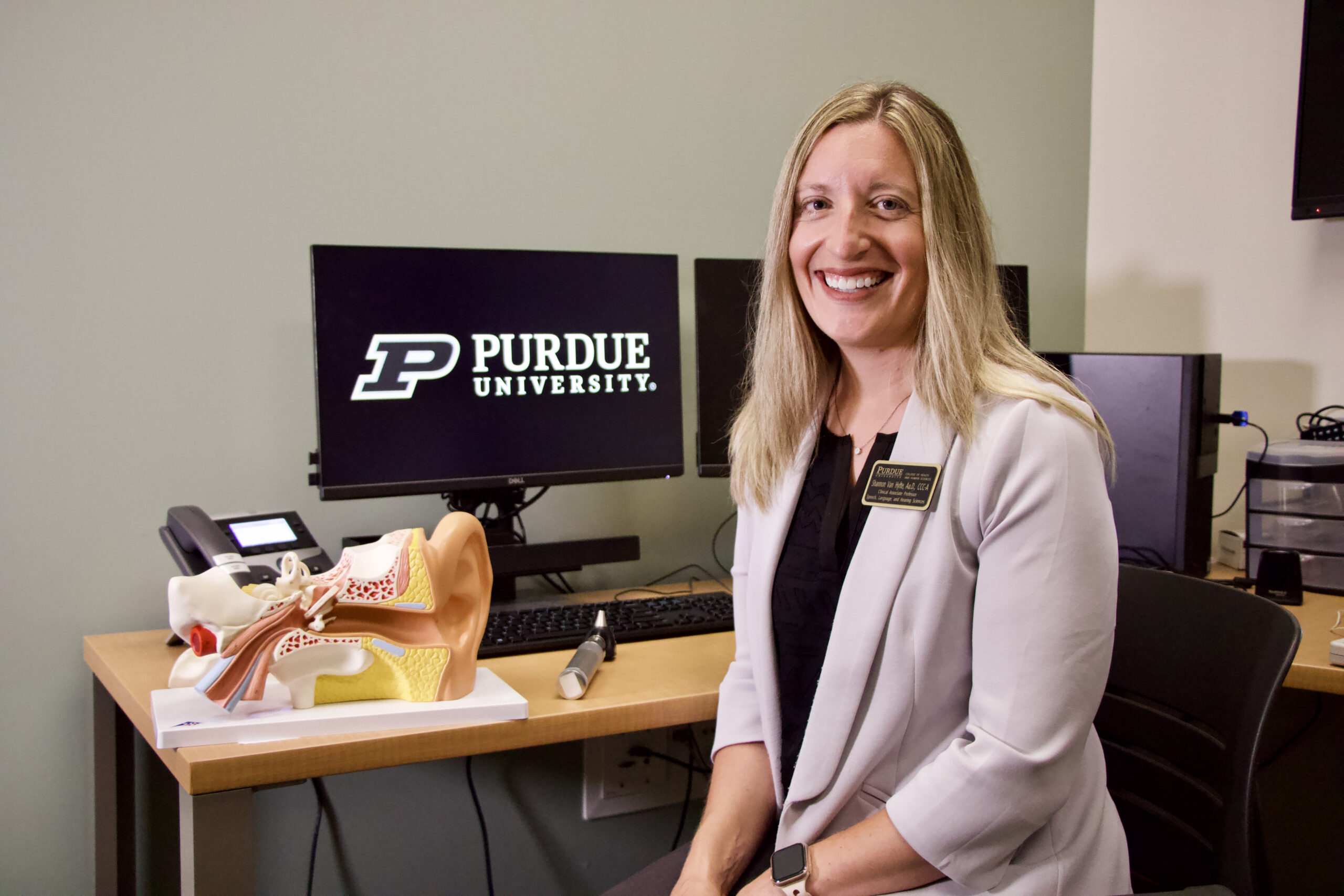Purdue expert: Over the counter hearing aids to help millions of Americans this fall

Shannon Van Hyfte, clinical associate professor in the Department of Speech, Language, and Hearing Sciences at Purdue University, said over the counter hearing aids will help millions hear better while promoting amplification use for those with hearing loss.Tim Brouk
Written by: Tim Brouk, tbrouk@purdue.edu
Millions of Americans suffering from hearing loss will get the opportunity to affordably improve their hearing this fall.
On Aug. 17, the U.S. Food and Drug Administration (FDA) issued a rule that hearing aids be made available over the counter (OTC) at brick-and-mortar drug stores and online sales. These hearing aids, which are expected to cost about $1,000 per pair, should hit the shelves by the end of October. Currently, hearing aids are only available via prescription, and these cost the patient up to $7,000.
Shannon Van Hyfte, Purdue University clinical associate professor and director of clinical education in audiology in the Department of Speech, Language, and Hearing Sciences, welcomes the news to make hearing aids more available to qualifying Americans ages 18 and older.
“They can be purchased without a medical evaluation or hearing test,” she said. “This will increase the availability of hearing aids for persons with perceived mild to moderate hearing loss. … It’s an underutilized need for folks to have an option for amplification.”
The ruling is expected to promote the improvement of hearing in adults. Van Hyfte said of the more than 32 million Americans with some degree of hearing loss, only 20%-30% adults take steps toward improving things via hearing aids.
Aside from better hearing, what other benefits are there for this FDA ruling?
It puts hearing loss in the public eye. We’re all talking about it more. It also recognizes the research that is out there that links hearing loss with social isolation, depression, cognitive decline and dementia.
We know people who identify hearing loss or perception of hearing loss take about seven years before they take action. Hopefully having these OTC hearing aids available will shorten that gap of time and make this more readily accessible.
What will the quality be of OTC hearing aids?
The quality is going to be a one size fits most. It won’t be perfect for everyone, but it will have the option for a volume control for some basic amplification. The one concern we have is that we do not see a regulation yet on refunds or returns, and there is no maximum gain regulation. So, audiologists have a little concern about the potential for damage to hearing.
What’s the difference between purchasing hearing aids over the counter and prescription hearing aids?
Prescription hearing aids, when fit by an audiologist, are done so based on a person’s functional communication as well as their ability to perceive soft or loud sounds. That functional communication piece is really important to make sure we’re fitting a patient with what they need for their lifestyle. Prescription hearing aids can often do more for background noise, for feedback or whistling-type noises, and we can verify those settings in our office specifically for that person’s ear. That’s going to be the difference between a “one size fits most” versus one that is prescription and defined specially for that patient’s hearing needs and hearing loss.
Should people still see an audiologist before they purchase OTC hearing aids?
I would encourage everyone regardless of the ability to purchase directly from online or a retail store to see an audiologist to have their hearing assessed to rule out any medical contraindications.
How will OTC hearing aids affect the audiology field?
People often ask audiologists, “Are you worried?” No, because our profession is bigger than hearing aids. I work with cochlear implants; I work with bone-anchored devices. Audiologists help people with balance. Our profession helps individuals from birth to end of life. A segment will need this OTC, and I’m glad it’s going to be available. But there is a lot more than OTC that folks need help with.
I’m actually really excited because if we can diminish the perception of “hearing aids equal I’m old,” this is wonderful for everyone to be able to hear and access speech in a better way. … I think it’s a great option, and I don’t think we should fear it. I think we should embrace it and help people get into the world of amplification safely.
Why are hearing aids so expensive to begin with?
The expense of hearing aids comes from the research that goes into computer chips in the hearing aid. The actual physical hearing aid is plastic, but it’s the computer chip that goes into it. Lowering the cost of hearing aids has been a mission for the government to try to make these more accessible, and I hope that means more adoption of hearing aid technology will come from that.
Why don’t more people pursue hearing aids to help with their hearing loss?
One of the big concerns coming out of research is that people don’t want to be perceived as old. One of the things about people having access to OTC hearing aids is that there could be more acceptance. This is no different than glasses or a retainer or other kinds of devices that we use to enable us to have better communication, better vision — all of those things that can make hearing aids more accepted in the public eye. It could change the vision of what a hearing aid is.
Discover more from News | College of Health and Human Sciences
Subscribe to get the latest posts sent to your email.